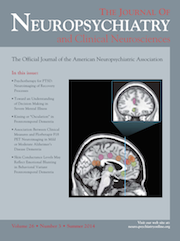Cognitive and Other Predictors of Change in Quality of Life One Year After Treatment for Chronic Myelogenous Leukemia or Myelodysplastic Syndrome
Abstract
The role of cognitive function in quality of life is important among the growing numbers of survivors after cancer treatment. The authors conducted a prospective cohort study of 106 adults evaluated 5.6 months (median) after diagnosis and 77 of 83 (93%) survivors 12 months later with neuropsychological assessments yielding information about simple reaction time to stimuli and other aspects of cognitive function and with two quality of life measures. The two most consistent predictors of change in quality of life were baseline quality of life ratings and simple reaction time. This novel finding about simple reaction time warrants further confirmation.



